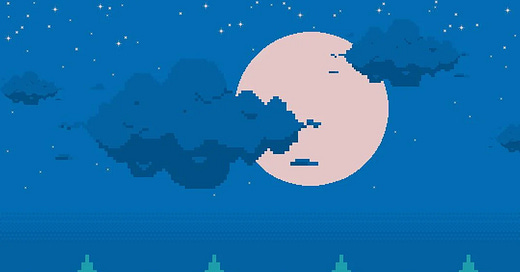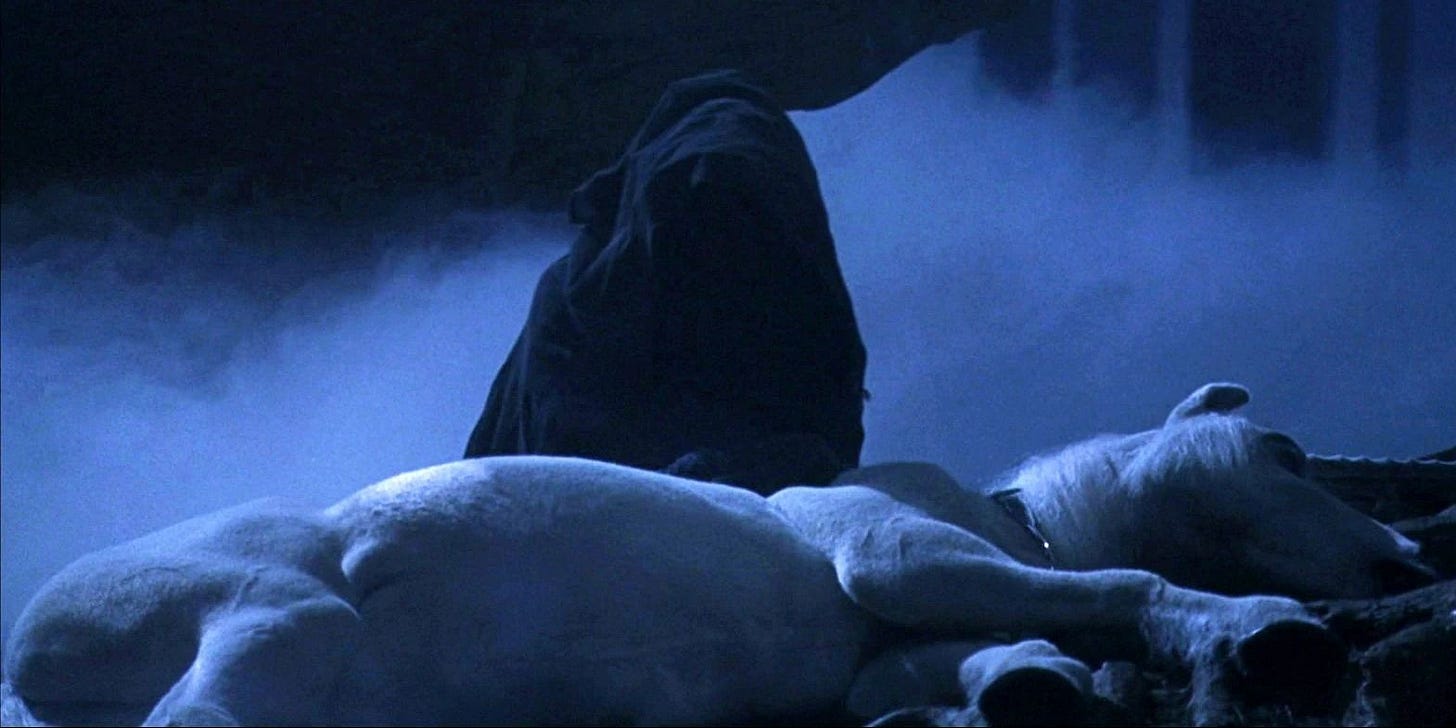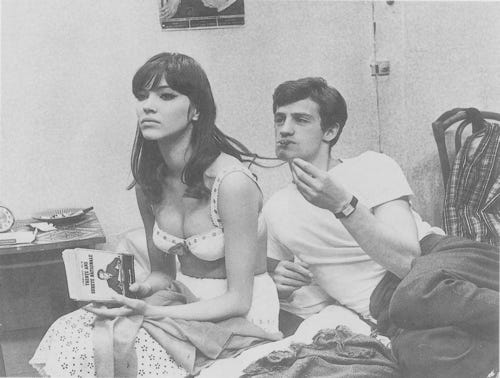“Midway upon the journey of our life, I found myself within a forest, dark, for the straightforward path had been lost…” (Dante’s Inferno)
Some years ago I came across a (now-deleted) Twitter thread by the writer
. At the time, the weight of what had just whooshed past me on the interwebs hardly registered, and like so many other things, I didn’t think about it again.Meanwhile, the lantern of my life bobbed along. A chance encounter led to a serious relationship. A career I’d expectedly left behind unexpectedly came back to me. A novel-in-progress unspooled all the way to the seventy page mark and (for the fourth time in my life!) stopped precisely there. I tried to keep writing and failed. I tried to keep reading and mostly failed. In lieu of the poet’s life, I devoted myself to moving my car, so that the streets of the city could be made clean, and many times over, but never on the holy days. I saw the Northern Lights for the first time. I played six thousand games of chess. A fishbone lodged itself in my throat on the island of Elafonisos in the Peloponnese. The proverbial bone in my throat, the proverbial car-that-must-be-moved, look at me now, living in sin with a woman I love. Citations were issued. A puppy was purchased, vaccinated, rushed to the hospital in the dead of night. The scenery, changing all the while. The streets, never clean for an instant.
How rare it is—for a thing to touch the force field of memory, and fail to shatter.
A month ago, a familiar missive bubbled up to the surface of my little black mirror.
“If you don’t switch to hard mode by 35, life switches to impossible mode for you by 45.”
While Rao leaves the specifics of “difficulty” relatively open-ended, the video game metaphor is fun to explore. I think it’s got legs.
We might equate Easy Mode with all of life leading up through adulthood’s entry-level successes: a first job, a first apartment, a first relationship. Towards the end of the game, you have developed the semblance of a life-on-your-own. But the path is still straightforward, flat, clearly marked: there are, on this level, forever more “firsts” to accomplish. It’s as if every door in your path has been left ajar, and every sidewalk is a conveyor belt. You’re a blob, you’re channeling your inner Kirby, which is to say that you’re seeing and incorporating and amalgamating. And by now, you have internalized some conception of The Work as the process through which you acquire certain status markers, and the Good Life as the possession of them—all the things.
What’s next? A thought experiment:
Let’s suppose that you were able, every night, to dream any dream you wanted to dream. And that you could, for example, have the power, within one night, to dream 75 years of time... And naturally, as you began on this adventure of dreams, you would fulfill all your wishes. You would have every kind of pleasure you could conceive. And after several nights of 75 years of total pleasure each, you would say, Wow that was pretty great… But now let’s have a surprise. Let’s have a dream which isn’t under control… And you would dig that, and come out of that, and you would say, Wow, that was a close shave, wasn’t it? And then you would get more and more adventurous, and you would make further and further out gambles as to what you would dream. And finally, you would dream where you are now. You would dream the dream of living the life that you are actually living today. (Alan Watts)
Rao draws the boundary in tech-speak, through the lens of something called the Lebowski theorem: A superintelligent A.I. will not pursue a task that proves more difficult than hacking its reward function.
Ah, the bourgeois ego-death that awaits us all. Here at the end of history, you don’t have to level up. You can just keep playing, vibing, accumulating. Easy Mode’s final boss is a kind of Hotel California—a freedom trap that can be sustained long past its welcome, with no obvious exit ramp.
In Lebowski terms, the reward function can be hacked. It’s just going to feel a bit like drinking unicorn’s blood.
Hard Mode begins with the conscious decision not to game the system, to forgo the easy wins in favor of something murkier. Rao gives a few default examples: studying a subject with enough interest that you don’t have to study for the test, and taking fitness seriously (where there is no test, and therefore no solution manual).
The more I think about it, though, the more it seems like all the really vital stuff in life—the paths and connections which, to borrow a phrase from Deleuze, “increase the power of your existing”—can be mapped onto this indeterminate plane. After all, how might we say a lifelong friendship changes you? How about the death of a loved one? The birth of a child? What does it even mean, to experience profound love?
There is no universal language for this kind of experience. It must dye itself in your wool before it can be described. Every now and then, of course, we might recognize its glint, catch a bit of shrapnel from the future. But the great prophesies were never meant to be scrutinized, pored over. Only the passage of time can disentangle the letters.
In the end, the real crux of the task is in the continuity of thought required, the steadfastness of that original commitment in the face of incremental responsibility. You must Do The Thing.
So yeah, Hard Mode: A sense of purpose that transcends any kind of destination or trade-off, and where the rewards are not linearly predictable or even easily defined. Fun!
Here I’d like to make a confession: I don’t know if I’m in Hard Mode or Hotel California. I can’t tell if I’ve got one foot in one door and one foot out the other, or what.
How can you tell if the density of air around you is weighted down with imperative or inertia? And what is Impossible Mode?
The loose consensus among my friends would suggest that timelines are rarely synchronous. Some people dive into Hard Mode right out of high school. Others step into it right before it’s too late. Whatever the case, there is no avoiding the sensation of risk. In Hard Mode, you are beyond the feeling of perpetual winning. Each possible path now consists of discrete actions and consequences, all of which exact a price.
Another confession: Second son that I am, I’ve never been good with imperatives. In fact, I’ve always been uniquely drawn to the sense of boundlessness I had in the back half of the 2010s, coming out of college and into my early twenties. It verges on a core memory, that first heady whiff of a life-on-your-own. You can picture it, your bright-lights era, if not remember it in your own way—the moment when you woke up in a snow-globe city and everything about you was weak knees, gyration, amnesia, and a wad of cash could change your life, because you could then, you could change everything in an instant. I’ve always admired the sudden urgency with which some people run up out of the subway.
In the intervening years, my nostalgia for this fire in which identities are forged has at times seemed irrepressible. More recently, I’ve come to doubt, if not mistrust, its special status. This is less a normative judgment and more so the recognition that there is more. I think I also struggled, in retrospect, to understand the scope of path dependency—that what begins boundlessly tends toward boundlessness. We conceive of identity and achievement as a series of decisive moments, plot points hinging on an arc. The reality is that the critical junctures never arrive as a single scene. They are years-long turns, a thousand iterated choices.
If I were to hazard a guess, the boundary between modes can be teased out when you first begin to gear those choices in favor of desired outcomes. The problem is, at this stage, you’re probably still winning, and this is the defining feature of Easy Mode.
Enter Nosferatu.

As if by some otherworldly command—“Nature, increase thy thunders”—your desired outcomes begin to elude you. For the first time in your life, you’re taking some hits, discovering the true meaning of low HP. Maybe you harken back to your carefree days of winning and wandering, when the objects of your desire were no more than casual side-quests, choices geared to the literal absence of outcome. A new voice announces itself on the airwaves of your brain: Come to me… You should never have ventured to leave this place. Here, at my side, you will sup on the carnal delights of effortless frolic for eternity.
I know what you’re thinking. Carnal delights, effortless frolic… How bad could it be? Just one night’s stay in the ruins of a Carpathian castle.
It seems to me, though, that the end state of never-passing-through is a kind of contingent existence, what Mark Fisher terms “detached spectatorialism.” In short, a half-life—blissfully empty of covenants, failures, crises. The irony of Nosferatu’s curse is that you will get what you desire. The universe will insidiously remove all the attachments and obstacles that weigh down your path. It will deny you every form of covenant. It will reject your capacity to feel victory. It will nail you to the mast of your crisis-free life. Impossible Mode.
Things don’t have to get that far, of course. One day, long before the vampiric hand punctures the earth of your local cemetery, you will wake up in Dante’s forest, where the one true way has been lost. What to say? Where to go? The proverbial fishbone, the proverbial car-that-must-be-moved, etc etc.
I’m reminded of the old tracker’s maxim: It was never about knowing where you’re going. It all comes down to knowing how to get there, how to take the next step.
I can only imagine that, on the other side of Hard Mode, the delta between choice and desire inevitably collapses to zero. The day will come when you simply choose to elevate the task over and above the suffering involved, the realized results, the sense of progression. There can be no outside support. Nobody else could ever hope to understand; they didn’t make the choice. But every time you return to it, you re-establish your connection. You affirm the original choice. You affirm it so many times it ends up not feeling like a choice at all.
There is, in the end, only the choice. What is there to do, on the other end of Anton Chigurh’s cattle gun, but double-down? You have to call it.










He’s back
We’re so back